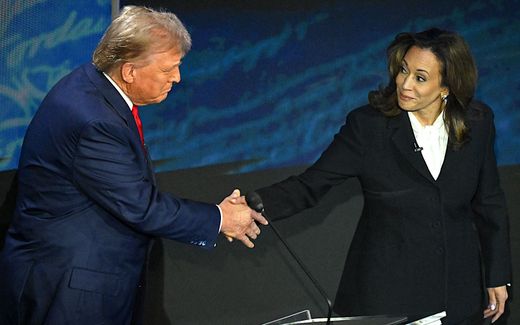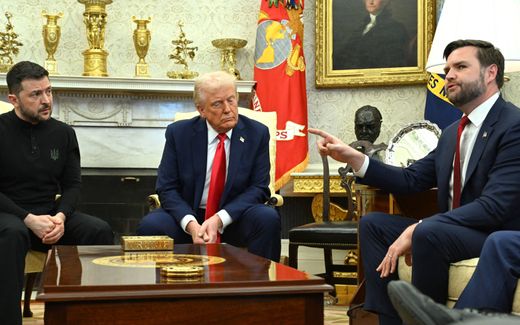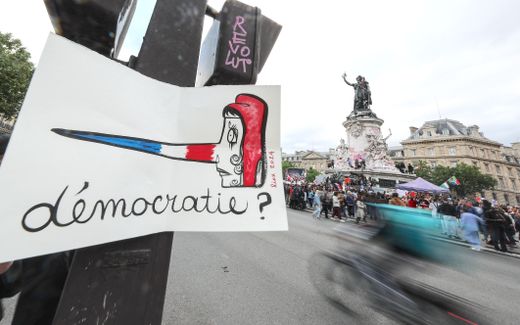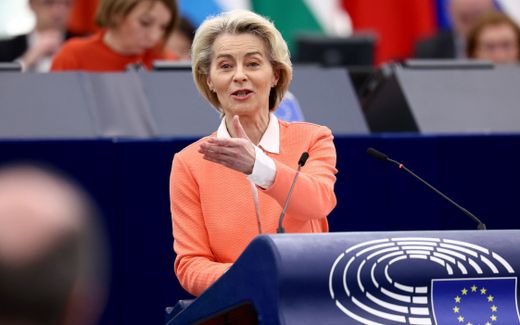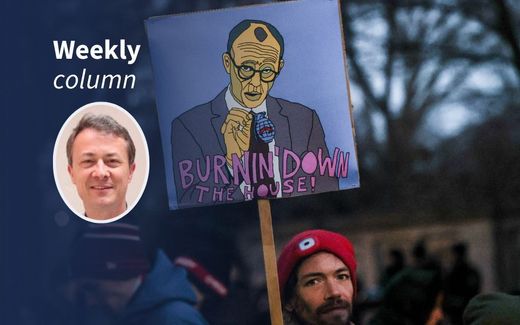How European Christians can approach the 'culture wars'
01-05-2025
Christian Life
Bruce Barron
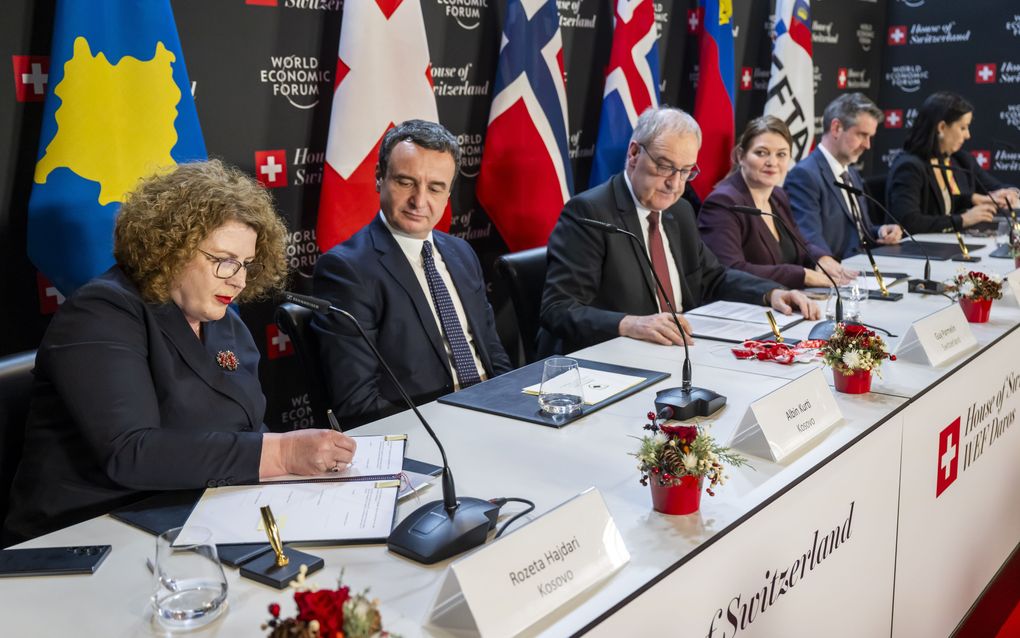
Leaders from Kosovo and Switzerland come together to sign a trade agreement at this year's World Economic Forum meeting in Switzerland. Photo EPA, Laurent Gillieron
Christian Life
European churches should be 'nonpartisan' and not engage in 'culture wars', says a spokesperson for the European Evangelical Alliance (EEA).
Stay up to date with Christian news in Europe? Sign up for CNE's newsletter
The word "evangelical" evokes all kinds of associations, religious and political. Those are thrown into the European conversation on Evangelical Christian identity. This is part of the debate about the relationship with the United States, especially its president, Donald Trump.
Yet, Julia Doxat-Purser, a socio-political representative for the EEA, emphasises that churches should remain "nonpartisan," according to a Q&A session conducted by Bruce Barron. Although it is acceptable that Christians join specific political parties, Doxat-Purser goes on to say that they should never become "our complete loyalty," or our idols, and to acknowledge that no party is entirely correct in its overall position.
When it comes to political party participation, there is a "gospel-related reason for nonpartisanship," she argues, and she emphasises that "there can be left-leaning and right-leaning views on supporting the family," for example. So, how can Christians not get caught up in today's culture-wars mentality while still being the salt and light in an increasingly polarised world? Doxat-Purser has those answers.
How has the EEA gained respect as a player in European politics?
"We don't just talk to people on our side but also with those who are not on our side. We treat them as fellow human beings who want to improve the world, not as the enemy. We believe what we believe is reasonable and can be helpful to them as they make their decisions.
We do work on issues of abortion and sexuality, but we refuse to be labelled as caring only about those issues. Since we are seen as working with people of different political persuasions, providing helpful information, and being trustworthy, people rarely want to talk with us.
I was in a meeting with a member of the European Parliament who was talking about human rights in China. He suddenly asked, 'What do you think about abortion?' I answered, 'I don't know if we would agree on abortion, but we are both concerned about human rights in China, so let's stick to that topic.'
Another EEA representative was meeting with a very senior European Commission official who said, 'You do know we don't do God here.' My colleague replied, "Yes, but you do human rights, and that's what we are here to talk about." They developed a good working relationship, and my colleague was able to help the European Commission develop good policy on religious freedom issues."
How do you deal with the variety of views you represent within the EEA?
"European countries vary widely in terms of the proportion of evangelicals, experience of democracy, and political leanings. The EEA needs to represent all of them, so we speak only where most will agree. We know we can speak in support of religious freedom. On other issues, we develop a policy position and have it reviewed by an advisory team with members from different regions of Europe. We take it to the EEA board if it is a sensitive matter.
Sometimes, it can be difficult to bite our lips. For example, we want to stand with Ukraine, but not in a way that gets Russian evangelicals arrested."
How do you approach the issue of participation in political parties?
"The EEA strongly believes the church must be nonpartisan, although individual Christians may join political parties. One reason why the church must be nonpartisan is that no party is completely right. Our security can never be placed in a political party. It's okay for individual Christians to join a political party, but we must never give a party our complete loyalty. If we do, it's idolatry.

There's a gospel-related reason for nonpartisanship, too. If we give the impression that Jesus is, for example, a member of the Green party, then if you're not a Green, you will not be interested in Jesus.
We need to be biblically rooted in our thinking. The Bible clearly demonstrates the importance of families. However, there can be left-leaning and right-leaning views on how to support the family.
Some politicians love to get the church on board with them by giving us some political wins or funding, inviting them to nice events, and talking about our nation's Christian heritage. But then we may go quiet when they act unethically because we are too close to them and reliant on their funding. You might say that's politics, but that also might be manipulation."
What is your reaction to Christians' tendency to engage forcefully in culture wars?
"I can understand how Christians can get caught up in culture-war thinking. We are labelled as extremists because we stand up for the unborn. We are called dangerous for standing up for traditional marriage. It feels like war, and we are tempted to start fighting when attacked. But what would Jesus do? One of the hardest things he calls us to do is love our enemies. The only people he got angry with were the religious leaders.
That doesn't mean we stay silent or withdraw. We should engage, even on hot-button issues, but with grace and respect. We should make our criticisms specific and not demonise people in general. That is hard to do when social media is full of evidence that we hate the other side.
We should always be seeking to persuade. We are Christ's ambassadors, so his reputation is at stake. It's more effective politically not to shut doors on anyone, and people think you are more reasonable this way.
When we share the gospel, we are very careful in our communication, seeking to build bridges and persuade others. Why should we be different in politics?
I don't believe a culture-wars model of engagement honours Christ, and I don't believe it works either."
What points would you like to make for Christians elsewhere in the world who seek to be salt and light in their own political contexts?
"Let us all examine policies and politicians in search of biblical virtues. Justice, compassion, responsibility, righteousness, freedom, and faithfulness don't belong to any political ideology. All human beings are made in God's image, including the ones we don't like, and God wants human beings to flourish in their lives and their relationships with him. That's what good political decision-making should focus on.
When the Israelites wanted a king (see 1 Samuel 8), God warned that it wouldn't go well, and it didn't. That is a warning against a concentration of power. We don't see democracy in the Bible, but we have a strong indication in favour of checks and balances.
We should avoid two responses: switching the news off because it's too scary or depressing or getting so caught up in events that we start thinking and speaking like everyone else. To be salt and light, we should speak in a way that makes a good impact, not as others do."
CNE took this interview from Bruce Barron's Substack which was conducted on March 12, 2025.
Related Articles

